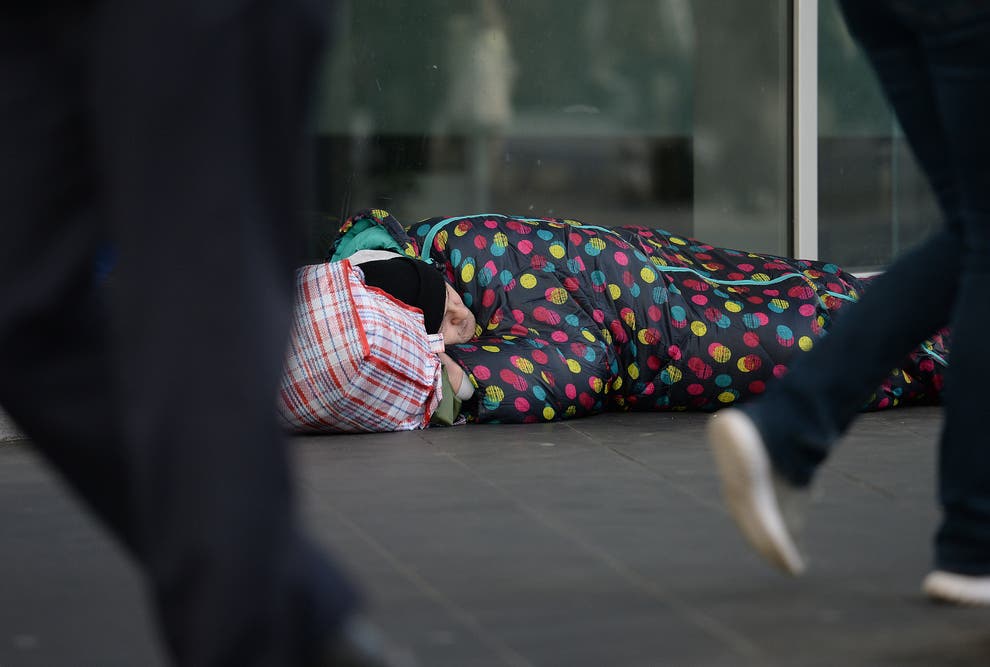Rough sleeping rises in London despite commitment to house people during pandemic, figures show
Campaigners warn government pledges made at start of public health crisis have ‘fallen away’ with progress ‘in imminent danger of being lost’

Your support helps us to tell the story
From reproductive rights to climate change to Big Tech, The Independent is on the ground when the story is developing. Whether it's investigating the financials of Elon Musk's pro-Trump PAC or producing our latest documentary, 'The A Word', which shines a light on the American women fighting for reproductive rights, we know how important it is to parse out the facts from the messaging.
At such a critical moment in US history, we need reporters on the ground. Your donation allows us to keep sending journalists to speak to both sides of the story.
The Independent is trusted by Americans across the entire political spectrum. And unlike many other quality news outlets, we choose not to lock Americans out of our reporting and analysis with paywalls. We believe quality journalism should be available to everyone, paid for by those who can afford it.
Your support makes all the difference.Rough sleeping has risen in London over the past year, new figures reveal, despite a government pledge to house everyone during the pandemic.
Data published by the Combined Homelessness and Information Network shows 11,018 people were seen rough sleeping in the capital during 2020-21, marking a 3 per cent increase on the previous year.
There has also been a 7 per cent rise in people sleeping on the streets for the first time, with the figure now standing at 7,531 – 68 per cent of the overall rough sleeping population recorded – indicating that hardship during the pandemic has forced people out of housing.
Campaigners warn that the increase suggests the commitments made at the start of the pandemic have “fallen away” and that progress to house people is now “in imminent danger of being lost”.
The Everyone In programme, introduced last March, required all councils to place people who were sleeping rough into emergency housing such as hotels, and thousands were housed as a result.
In July, ministers said local authorities would be granted funding to “prevent those housed under the scheme from returning to the streets”.
But the latest figures indicate that thousands have since returned to the streets, or had not been housed at all, with 2,126 people seen sleeping rough this year having also been seen in 2019-20.
Jon Sparkes, the chief executive of Crisis, said: “There is nothing inevitable about this. Last year we saw brilliant but short-lived measures that dramatically reduced the numbers of people sleeping rough.”
He said it was “unacceptable” that as coronavirus restrictions eased, rough sleeping was still at pre-pandemic levels across London and called for “long-term solutions” to “end rough sleeping for good”.
Rick Henderson, the chief executive at Homeless Link, warned that without “decisive action”, much of the good work of the past 15 months risked “being undone”.
“The Everyone In programme is coming to an end, bringing with it the risk of many people still housed in hotels ending up back on the streets,” he said.
“Add to that the ending of the recent evictions ban, the winding down of the furlough scheme and a huge shortfall in affordable housing and it’s clear that many people will struggle to stay afloat in the coming months.”
A government Spokesperson said: “This is a misrepresentation – these statistics capture engagement with rough sleeping services rather than rough sleeping itself.
“The latest annual rough sleeping snapshot recorded an estimated 2,688 people sleeping rough on a single night in England, down 43 per cent since 2018.
“We have helped 37,000 people into accommodation so far, and this year we are providing over £750m this year alone to tackle homelessness and rough sleeping.”
Join our commenting forum
Join thought-provoking conversations, follow other Independent readers and see their replies
Comments